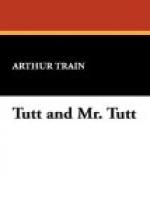“You’re quite wrong about my theory being a half truth,” retorted Mr. Tutt. “It is fundamentally sound. The fellow who steals a razor or a few dollars is regarded as a mean thief, but if he loots a trust company or takes a million he’s a financier. The criminal law, I maintain, is administered for the purpose of protecting the strong from the weak, the successful from the unsuccessful the rich from the poor. And, sir”—Mr. Tutt here shook his fist at an imaginary jury—“the man who wears a red necktie in violation of the taste of his community or eats peas with his knife is just as much a criminal as a man who spits on the floor when there’s a law against it. Don’t you agree with me?”
“I do not!” replied Tutt. “But that makes no difference. Nevertheless what you say about the criminal law being devised to protect the rich from the poor interests me very much—very much indeed But I think there’s a flaw in that argument too, isn’t there? Your proposition is true only to the extent that the criminal law is invoked to protect property rights—and not life and liberty. Naturally the laws that protect property are chiefly of benefit to those who have it—the rich.”
“However that may be,” declared Mr. Tutt fiercely, “I claim that the criminal laws are administered, interpreted and construed in favor of the rich as against the liberties of the poor, for the simple reason that the administrators of the criminal law desire to curry favor with the powers that be.”
“The moral of which all is,” retorted the other, “that the law ought to be very careful about locking up people.”
“At any rate those who have violated laws upon which there can be a legitimate difference of opinion,” agreed Mr. Tutt.
“That’s where we come in,” said Tutt. “We make the difference—even if there never was any before.”
Mr. Tutt chuckled.
“We perform a dual service to society,” he declared. “We prevent the law from making mistakes and so keep it from falling into disrepute, and we show up its weak points and thus enable it to be improved.”
“And incidentally we keep many a future statesman and prophet from going to prison,” said Tutt. “The name of the last one was Solomon Rabinovitch—and he was charged with stealing a second-hand razor from a colored person described in the papers as one Morris Cohen.”
How long this specious philosophic discussion would have continued is problematical had it not been interrupted by the entry of a young gentleman dressed with a somewhat ostentatious elegance, whose wizened face bore an expression at once of vast good nature and of a deep and subtle wisdom.
It was clear that he held an intimate relationship to Tutt & Tutt from the familiar way in which he returned their cordial, if casual, salutations.
“Well, here we are again,” remarked Mr. Doon pleasantly, seating himself upon the corner of Mr. Tutt’s desk and spinning his bowler hat upon the forefinger of his left hand. “The hospitals are empty. The Tombs is as dry as a bone. Everybody’s good and every day’ll be Sunday by and by.”




